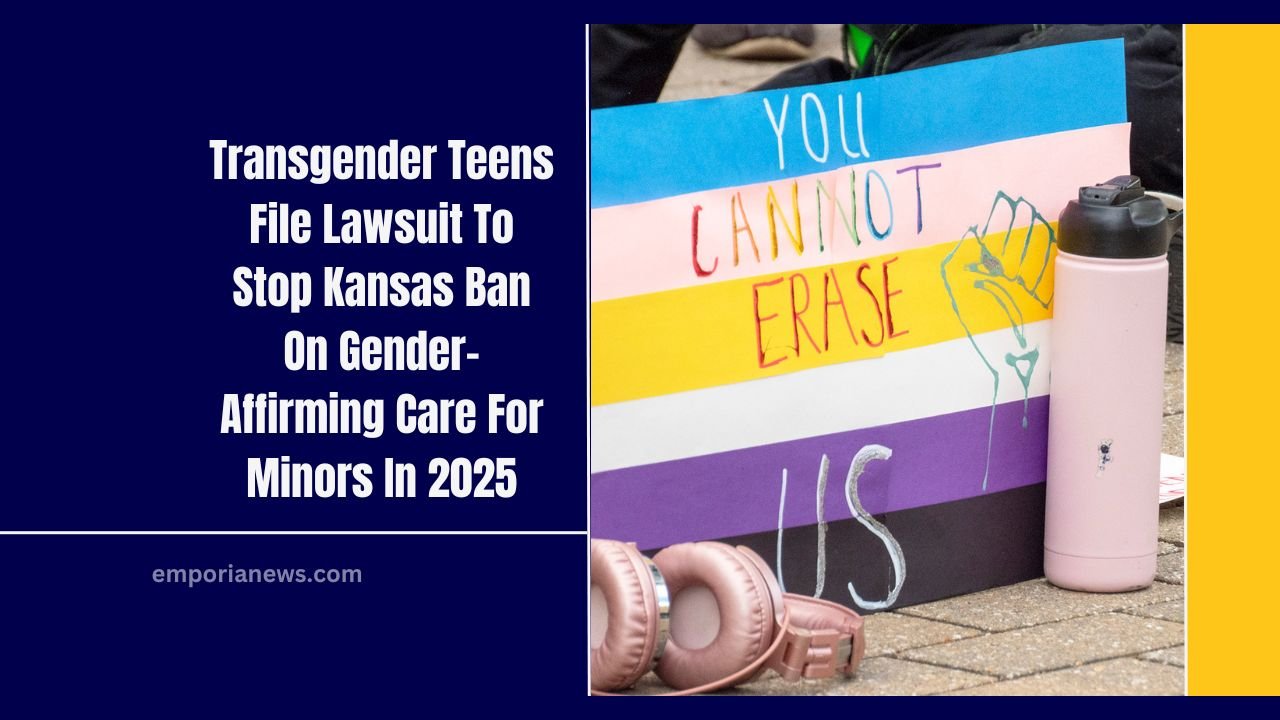In a pivotal legal challenge, two transgender teenagers and their families filed a lawsuit against the state of Kansas to block the enforcement of a controversial new law that prohibits gender-affirming health care for minors.
Filed in Douglas County District Court in Lawrence, the lawsuit, backed by the American Civil Liberties Union (ACLU) and its Kansas affiliate, seeks to overturn the law, which plaintiffs say violates the Kansas Constitution’s guarantees of equal protection and fundamental rights.
The plaintiffs — a 16-year-old transgender boy and a 13-year-old transgender girl, using the pseudonyms Ryan Roe and Lily Loe — argue that the new law endangers their health and well-being by denying access to essential medical treatments like puberty blockers and hormone therapy.
Understanding the New Kansas Law on Gender-Affirming Care
The law in question, passed by the Kansas Legislature in February 2025, prohibits medical professionals from offering or recommending puberty suppressants, hormone therapies, and surgical procedures to minors experiencing gender dysphoria.
Key Provisions of the Law
| Provision | Details |
|---|---|
| Treatment Restrictions | Bans puberty blockers, hormone therapy, and surgeries for minors |
| Medical Consequences | Providers risk license suspension or legal penalties for non-compliance |
| Public Program Ban | Disallows state-funded programs (e.g., Medicaid) to cover gender-affirming treatment |
| Date Passed | February 2025 |
| Status | Enacted after overriding a veto by Democratic Gov. Laura Kelly |
The Lawsuit and Its Implications
The ACLU of Kansas, in its court filing, stated that the law is discriminatory and unconstitutional because it specifically targets transgender youth and prevents them from accessing medical treatments deemed necessary by professional health associations.
“Our clients and every Kansan should have the freedom to make their own private medical decisions and consult with their doctors without the intrusion of Kansas politicians,” said D.C. Hiegert, Civil Liberties Legal Fellow at the ACLU of Kansas.
According to the complaint, Ryan and Lily have experienced significant emotional and physical improvement since beginning their gender-affirming treatments.
However, with this new law in effect, their Kansas-based healthcare providers are prohibited from continuing this care, putting their mental and physical health at serious risk.
Political Reactions and Statements
Kansas Attorney General Kris Kobach, a vocal supporter of the law, has pushed back against the lawsuit. He stated:
“Once again, the ACLU is attempting to twist the meaning of the Kansas Constitution into something unrecognizable.”
Kobach emphasized that the Kansas Legislature was acting within its authority to protect minors from what he referred to as “harmful surgeries.”
State Senate President Ty Masterson, also a Republican, echoed similar sentiments on social media:
“In Kansas, we don’t allow the mutilation of minors. The Help Not Harm Act is now protecting Kansas kids from the Left’s dangerous woke agenda.”
Context: How the Law Was Passed
Previous efforts to pass bans on gender-affirming health care in Kansas had failed repeatedly. However, the 2024 state elections shifted the legislative balance, giving the Republican majority enough votes to override a veto by Governor Laura Kelly, a Democrat who has supported LGBTQ+ rights in the past.
This law makes Kansas one of several states that have moved to restrict or eliminate access to gender-affirming care for minors, a move widely condemned by medical professionals and civil rights organizations.
The Bigger Picture: Health and Civil Rights
This lawsuit marks another chapter in the nationwide legal and political debate over gender-affirming care. Organizations like the ACLU argue that such laws infringe on the rights of individuals and families to make private medical decisions in consultation with trained professionals.
Meanwhile, supporters of the ban argue it’s necessary to protect minors from making irreversible medical decisions before adulthood, even though major medical associations support access to gender-affirming care for youth under guided, evidence-based protocols.
The Kansas lawsuit reflects a deep divide between civil rights advocates and lawmakers over youth healthcare rights.
As the legal battle unfolds, transgender teens like Ryan and Lily face an uncertain future. The outcome could reshape access to gender-affirming care not only in Kansas but across the country.




